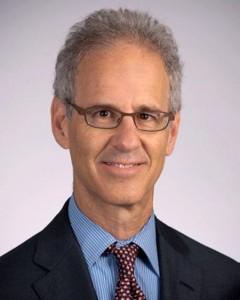
A panel of employment discrimination specialists from the U.S. and China, including a New Paltz alumnus, presented a discussion on April 13 surrounding claims of discrimination and violations of human rights in the workplace. About 100 students, faculty and staff members attended the event, held in the Student Union Building.
The panel, moderated by political science Professor Nancy Kassop, was organized by Philip Berkowitz ’75 (English/Journalism), a member of the SUNY New Paltz Foundation Board. An internationally known employment lawyer and U.S. co-chair of Littler Mendelson’s International Employment Law Practice, Berkowitz advises multinational and domestic companies in a wide range of industries on employment-related matters, and spoke about his experiences defending companies operating in the U.S.
Berkowitz was joined by Chris Kwok, alternative dispute resolution coordinator at the U.S. Equal Employment Opportunity Commission’s Mediation Program in New York City; Tiffany Ma of Young & Ma LLP, who specializes in labor and employment law; and Bin Xie, a human rights defender and executive director of Zhengzhou Yirenping, a disability rights advocacy organization in China.
The event was sponsored by the College of Liberal Arts & Sciences, the Department of Political Science and International Relations, the Asian Studies Program, and the Alumni Relations Office.
Berkowitz explained that it is unlawful for employers to discriminate against individuals on three different legal levels, which Ma identified as federal, state and local.
“Anywhere that you end up, realize that there are possibly three categories of law that apply to you,” said Ma. “So don’t forget to check your local ordinances, because you may be protected in a way that you don’t know federally.”
Gender, pregnancy, race, religion, national origin, and color were some attributes Ma said an employer is prohibited from discriminating against. Disability, age, citizenship status, marital status, sexual orientation, having a prior criminal record, and being a victim of domestic violence were some other features she listed.
“In the United States, there are overlapping laws that prohibit employers from taking into account any of these different statuses in the terms and conditions of employment,” said Berkowitz.
Xie said China’s most important law when it comes to employment discrimination is the Employment Promotion Law of 2008, which is “very limited” in scope and covers disability, gender, ethnicity, migrant workers, and workers with infectious diseases.
“There is no definition of discrimination in disability,” said Xie, “so it’s very hard for a person with a disability to fight for their rights.”
Kwok was asked to explain the concept of “at-will” employment.
“If you go to work in New York State … employment at will means that you can be fired for any reason, or no reason, as long as the reason you’re fired is not illegal or prohibited,” said Kwok.
Berkowitz noted that this sharply contrasts with many other countries.
“Overseas, to fire somebody – in virtually every other country in the world – the employer has to have a good reason, has to have cause, to fire somebody,” said Berkowitz. “If they don’t have good reason to fire somebody, then that firing could be illegal, and the employer may be required to reinstate or pay a certain amount of severance to the individual.”
There are exceptions, Berkowitz noted, for union members protected by contracts – who he said only make up about six percent of the U.S. workforce. And despite “at-will” status, discrimination laws actually do provide a lot more protection than it may seem. For example, simply being sick and visiting a doctor qualifies one as being disabled, and New York State protects anyone over age 18 from being discriminated based on age.
“Companies don’t want to be sued for any of these myriad categories of discrimination,” he said.
Other topics covered by the panel included the differences between foreign companies doing business in the U.S. versus the U.S. doing business in China, and the cultural issues that may arise; issues faced by students working or interning abroad, and whether they are protected by employment discrimination laws; and the prevalence of foreign companies being managed by people who studied or worked in the U.S.

